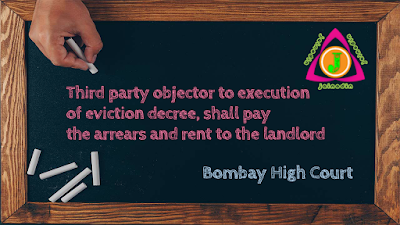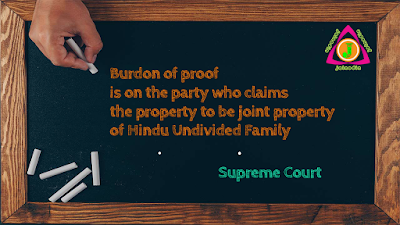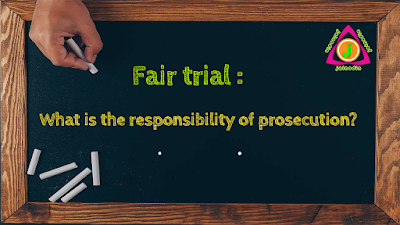While considering the claim of custody of a child, the Court acts in parens patriae jurisdiction and is to be governed solely by the consideration of the welfare of the child. In claim of custody of a child, the claim of Guardianship under Section 6 of the Act or better financial resources of a parent or lack of any adverse material against a parent or the fact that the parent truly loves the child and has the welfare of the child in mind, though relevant, cannot act as sole criteria for determining the welfare of the child and consequently the claim of the custody of the child.[Para No.18]
30 April 2020
No bar of res judicata to second suit for eviction of tenant
Landlord filed suit for eviction on the grounds of bona fide requirement, erection of unauthorized permanent structures, change of user, and unlawful subletting - Suit dismissed - Appeal was also unsuccessful - After less than three months, the landlord issued a "notice for possession" to the tenant and again filed second suit for eviction on the grounds of bona fide requirement, arrears of rent, and permanent construction on the suit premises
Is the second suit stand barred by res judicata and Section 12 of the Bombay Rents, Hotel and Lodging House Rates Control Act, 1947 ("the Bombay Rent Act")?
True, subsequent events may affect the suit outcome. For that, either party to the suit should bring to the court's notice those later developments. For that even the amended Order 6, Rule 17 of CPC provides. Otherwise, the court itself, in the interest of justice and to avoid multiplicity of proceedings, may take note of those developments. But law does not compel a person to invariably bring on record all the later developments through amendment. If the later developments provide an independent cause of action, the party's right to a fresh legal remedy remains intact. This proposition applies with more rigour if the cause of action is recurring.[Para No.54]
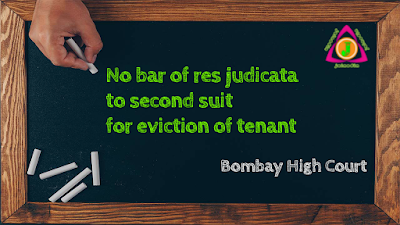
Default in rent remittance provides recurring cause of action. Every successive default provides an independent cause of action.
Later developments may affect that cause of action if they are duly brought on record; otherwise, they provide further independent cause of action. Even the doctrine of lis pendens does not defeat the suitor's independent right to sue. It is only a matter of prudence and convenience that all the related facts are brought under one umbrella of adjudication. More particularly, if the cause of action is recurring, each instance of recurrence provides an independent cause of action.
Legal words:
bonafide,
cause of action,
civil,
high court,
landlord,
notice,
rent,
res judicata,
tenant
Third party objector to execution of eviction decree, shall pay the arrears and rent to the landlord
Eviction Suit - Decreed in favour of Landlord - Execution proceeding - Third party, who has been a witness in the original suit, obstructed execution under order 21 Rule 97 of C.P.C. - Such obstruction pertition dismissed - Appeal - Judgment Debtor Tenant directed to pay the compensation or mesne profits as a condition-precedent for staying the decree of eviction, the Tenant remained unresponsive.
29 April 2020
The Court cannot go behind the language of the statute so as to add or subtract a word
The court cannot proceed with an assumption that the legislature enacting the statute has committed a mistake and where the language of the statute is plain and unambiguous, the court cannot go behind the language of the statute so as to add or subtract a word playing the role of a political reformer or of a wise counsel to the legislature. The court has to proceed on the footing that the legislature intended what it has said and even if there is some defect in the phraseology, etc., it is for others than the court to remedy that defect. The statute requires to be interpreted without doing any violence to the language used therein. The court cannot rewrite, recast or reframe the legislation for the reason that it has no power to legislate. [Para No.43]
WhatsApp Group is a public place
WhatsApp cannot be a public place if messages are exchanged on personal accounts of two persons. If these messages had been posted on WhatsApp Group, in that case the same could have been called as public place because all the members of the group, will have access to those messages. It is not the prosecution case that the alleged obscene messages were posted on WhatsApp Group of which the petitioner and the respondent No. 2 and others are the members. Therefore, sending the personal messages on WhatsApp will not amount to utterance of obscene words in public place. Therefore, Section 294 of the I.P.C. cannot be invoked.[Para no.10]
Legal words:
criminal,
defamation,
electronic evidence,
high court,
Investigation,
modesty,
Prostitution,
public place,
Whatsapp
28 April 2020
Recall of witness u/s.311 of CrPC is permissible If evidence which is sought to be brought on record is essential for the just decision of the case
It is, thus, seen that object of this section is that there may not be failure of justice on account of mistake of either party in bringing the valuable evidence on record or by leaving ambiguity in the statement of witnesses examined by the parties. This section is intended to bring finality to the litigation. The learned trial court is required to focus its attention on the aspect as to whether evidence which is sought to be brought on record is essential for the just decision of the case. If this criteria is fulfilled, then application for recall of witness moved by taking resort to the provisions of Section 311 of the Code of Criminal Procedure needs to be allowed by the learned trial court. [Para no.5]
What procedure should be adopted by court when chargesheet is filed against some accused out of several accused persons?
The catch comes when against one or more accused persons, a Report labelling them responsible for commission of the offence(s) is submitted vide chargesheet and it is also indicated that investigation is pending against the other named/unknown accused or otherwise. In such a situation, the Court has two options:
Legal words:
chargesheet,
cognizance,
criminal,
high court,
Investigation,
separate trial,
speedy trial
27 April 2020
Distinction between Murder, Culpable Homicide and Culpable Homicide Not Amounting to Murder
In State of AP vs Rayavarapu Punnayya, AIR 1977 SC 45, the Supreme Court made following observation:
" .... whenever a court is confronted with the question whether the offence is "murder" or "culpable homicide not amounting to murder", on the facts of a case, it will be convenient for it to approach the problem in three stages. The question to be considered at the first stage would be, whether the accused has done an act by doing which he has caused the death of another. Proof of such causal connection between the act of the accused and the death leads to the second stage for considering whether that act of the accused amounts to "culpable homicide" as defined in section 299. If the answer to this question is prima facie found in the affirmative, the stage for considering the operation of section 300, Penal Code is reached. This is the stage at which the court should determine whether the facts proved by the prosecution brings the case within the ambit of any of the four clauses of the definition of "murder"contained in section 300. If the answer to this question is in the negative the offence would be "culpable homicide not amounting to murder" punishable under the first or the second part of section 304, depending, respectively,on whether the second or the third clause of section 299 is applicable. If this question is found in the positive, but the case comes within any of the exceptions enumerated in section 300, the offence would still be "culpable homicide not amounting to murder," punishable under the first part of section 304, Penal Code."
Legal words:
criminal,
culpable homicide,
distinction,
exception,
high court,
murder,
Sec.302 of I.P.C.
Gravity of offence alone cannot be decisive ground to deny bail
By now it is well settled that gravity alone cannot be decisive ground to deny bail, rather competing factors are required to be balanced by the court while exercising its discretion. It has been repeatedly held by the Hon'ble Apex Court that object of bail is to secure the appearance of the accused person at his trial by reasonable amount of bail. The object of bail is neither punitive nor preventative. The Hon'ble Apex Court in Sanjay Chandra versus Central Bureau of Investigation (2012)1 Supreme Court Cases 49; wherein it has been held as under "The object of bail is to secure the appearance of the accused person at his trial by reasonable amount of bail.
The object of bail is neither punitive nor preventative. Deprivation of liberty must be considered a punishment, unless it can be required to ensure that an accused person will stand his trial when called upon. The Courts owe more than verbal respect to the principle that punishment begins after conviction, and that every man is deemed to be innocent until duly tried and duly found guilty. Detention in custody pending completion of trial could be a cause of great hardship. From time to time, necessity demands that some unconvicted persons should be held in custody pending trial to secure their attendance at the trial but in such cases, "necessity" is the operative test. In India , it would be quite contrary to the concept of personal liberty enshrined in the Constitution that any person should be punished in respect of any matter, upon which, he has not been convicted or that in any circumstances, he should be deprived of his liberty upon only the belief that he will tamper with the witnesses if left at liberty, save in the most extraordinary circumstances. Apart from the question of prevention being the object of refusal of bail, one must not lose sight of the fact that any imprisonment before conviction has a substantial punitive content and it would be improper for any court to refuse bail as a mark of disapproval of former conduct whether the accused has been convicted for it or not or to refuse bail to an unconvicted person for the propose of giving him a taste of imprisonment as a lesson. [Para No.12]
26 April 2020
Rule of natural justice need not be observed where fraud or misrepresentation is played
Petitioner was appointed as Distributor of LPG - Submission of "Residence Certificate" was essential eligibility criteria for awarding the distributorship - Distributorship awarded to him - Unfettered power to the Oil Company were given in the Dealership Agreement for termination, in case, any information found to be untrue or incorrect - Upon a complaint made by one of the unsuccessful complainants it was discovered that the furnished "Residential Certificate" to be false and incorrect - Oil Company, without issuing show cause notice terminated his distributorship. Therefore he claimed that absence of show-cause notice tantamount to absence of the opportunity of being heard and hence termination hits the soul of justice violating Article 14 of the Constitution of India and on this ground alone the said termination letter deserves to be quashed.
Held:

A Contract is like a written form of the law or like a private legislation that legally binds the parties, hence the aforementioned clause derives utmost sanctity from the agreement. The doctrine of 'Pacta sunt servinda' governs the contractual relationship and the clauses of the contract are the law between the parties. This doctrine presupposes strict compliance of the terms enumerated in the termination clauses of the agreement, otherwise it destroys the sanctity of the contract and eludes the future performance. [Para No.17]
Fraud and justice cannot go together. It is a settled law that "Fraud" vitiates every solemn act. In Lazarus Estate Ltd. v. Beasley, Lord Denning observed "No judgment of a Court, no order of a Minister can be allowed to stand if it has been obtained by fraud. Fraud unravels everything." In the same judgment Lord Parker LJ observed that fraud "vitiates all transactions known to the law of however high a degree of solemnity.
25 April 2020
Importance of cross examination in criminal trial
A witness is required to be cross-examined in a criminal trial to test his veracity; to discover who he is and what his position in life is; or to shake his credit, by injuring his character, although the answer to such questions may directly or indirectly incriminate him or may directly or indirectly expose him to a penalty or forfeiture (Section 146 of the Evidence Act). A witness is required to be cross- examined to bring forth inconsistencies, discrepancies and to prove the untruthfulness of the witness.[Para No.56]

It is open to an accused to raise such reasonable doubt by cross-examination of the prosecution witnesses to discredit such witness in respect of truthfulness and veracity. However, where the statement of prosecution witnesses cannot be doubted on the basis of the touchstone of truthfulness, contradictions and inconsistencies, and the accused wants to assert any particular fact which cannot be made out from the prosecution evidence, it is incumbent upon the accused to cross- examine the relevant witnesses to that extent. The witness, in order to impeach the truthfulness of his statement, must be cross- examined to seek any explanation in respect of a version, which accused wants to rely upon rather to raise an argument at the trial or appellate stage to infer a fact when the opportunity given was not availed of as part of fair play while appreciating the statement of the witnesses.
Scope of powers of remand by Appellate Court under Rules 23, 23A and 24 of Order 41 of C.P.C.
A conjoint reading of Rules 23, 23A and 24 of Order XLI brings forth the scope as also contours of the powers of remand that when the available evidence is sufficient to dispose of the matter, the proper course for an Appellate Court is to follow the mandate of Rule 24 of Order XLI CPC and to determine the suit finally. It is only in such cases where the decree in challenge is reversed in appeal and a re-trial is considered necessary that the Appellate Court shall adopt the course of remanding the case. It remains trite that order of remand is not to be passed in a routine manner because an unwarranted order of remand merely elongates the life of the litigation without serving the cause of justice. An order of remand only on the ground that the points touching the appreciation of evidence were not dealt with by the Trial Court may not be considered proper in a given case because the First Appellate Court itself is possessed of jurisdiction to enter into facts and appreciate the evidence. There could, of course, be several eventualities which may justify an order of remand or where remand would be rather necessary depending on the facts and the given set of circumstances of a case.
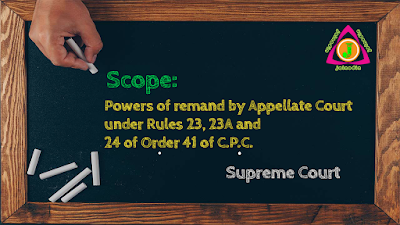
Remand would arise only when the factual findings of Trial Court are reversed and a re-trial is considered necessary by the Appellate Court. [Para No.25.4]
Principles governing the proof of a Will
As per Section 63 of the Succession Act, inter alia, requires that the Will ought to be attested by two or more witnesses. Hence, any document propounded as a Will cannot be used as evidence unless at least one attesting witness has been examined for the purpose of proving its execution.
A Will is executed to alter the ordinary mode of succession and by the very nature of things it is bound to result in earlier reducing or depriving the share of natural heirs. If a person intends his property to pass to his natural heirs, there is no necessity at all of executing a Will. It is true that a propounder of the Will has to remove all suspicious circumstances. Suspicion means doubt, conjecture or mistrust. But the fact that natural heirs have either been excluded or a lesser share has been given to them, by itself without anything more, cannot be held to be a suspicious circumstance specially in a case where the bequest has been made in favour of an offspring.
The propounder has to prove the legality of execution of the Will as also the genuineness thereof by proving the testamentary capacity of the testator as also his signatures and further by proving absence of suspicious circumstances.
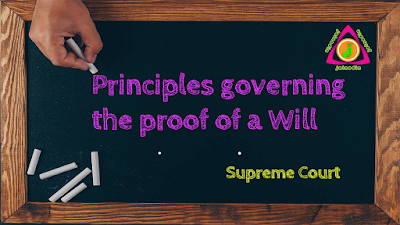 When there are suspicious circumstances regarding the execution of the will, the onus is also on the propounder to explain them to the satisfaction of the court and only when such responsibility is discharged, the court would accept the will as genuine. Even where there are no such pleas, but circumstances give rise to doubt, it is on the propounder to satisfy the conscience of the court. Suspicious circumstances arise due to several reasons such as with regard to genuineness of the signature of the testator, the conditions of the testator's mind, the dispositions made in the will being unnatural, improbable or unfair in the light of relevant circumstances or there might be other indications in the will to show that the testator's mind was not free. In such a case, the court would naturally expect that all legitimate suspicion should be completely removed before the document is accepted as the last will of the testator.[Para No.10.3]
When there are suspicious circumstances regarding the execution of the will, the onus is also on the propounder to explain them to the satisfaction of the court and only when such responsibility is discharged, the court would accept the will as genuine. Even where there are no such pleas, but circumstances give rise to doubt, it is on the propounder to satisfy the conscience of the court. Suspicious circumstances arise due to several reasons such as with regard to genuineness of the signature of the testator, the conditions of the testator's mind, the dispositions made in the will being unnatural, improbable or unfair in the light of relevant circumstances or there might be other indications in the will to show that the testator's mind was not free. In such a case, the court would naturally expect that all legitimate suspicion should be completely removed before the document is accepted as the last will of the testator.[Para No.10.3]Principles governing the adjudicatory process concerning proof of a Will could be broadly summarized as follows:–
- 1. Ordinarily, a Will has to be proved like any other document; the test to be applied being the usual test of the satisfaction of the prudent mind. Alike the principles governing the proof of other documents, in the case of Will too, the proof with mathematical accuracy is not to be insisted upon.
- 2. Since as per Section 63 of the Succession Act, a Will is required to be attested, it cannot be used as evidence until at least one attesting witness has been called for the purpose of proving its execution, if there be an attesting witness alive and capable of giving evidence.
- 3. The unique feature of a Will is that it speaks from the death of the testator and, therefore, the maker thereof is not available for deposing about the circumstances in which the same was executed. This introduces an element of solemnity in the decision of the question as to whether the document propounded is the last Will of the testator. The initial onus, naturally, lies on the propounder but the same can be taken to have been primarily discharged on proof of the essential facts which go into the making of a Will.
- 4. The case in which the execution of the Will is surrounded by suspicious circumstances stands on a different footing. The presence of suspicious circumstances makes the onus heavier on the propounder and, therefore, in cases where the circumstances attendant upon the execution of the document give rise to suspicion, the propounder must remove all legitimate suspicions before the document can be accepted as the last Will of the testator.
- 5. If a person challenging the Will alleges fabrication or alleges fraud, undue influence, coercion et cetera in regard to the execution of the Will, such pleas have to be proved by him, but even in the absence of such pleas, the very circumstances surrounding the execution of the Will may give rise to the doubt or as to whether the Will had indeed been executed by the testator and/or as to whether the testator was acting of his own free will. In such eventuality, it is again a part of the initial onus of the propounder to remove all reasonable doubts in the matter.
- 6. A circumstance is “suspicious” when it is not normal or is ‘not normally expected in a normal situation or is not expected of a normal person’. As put by this Court, the suspicious features must be ‘real, germane and valid’ and not merely the ‘fantasy of the doubting mind.
- 7. As to whether any particular feature or a set of features qualify as “suspicious” would depend on the facts and circumstances of each case. A shaky or doubtful signature; a feeble or uncertain mind of the testator; an unfair disposition of property; an unjust exclusion of the legal heirs and particularly the dependents; an active or leading part in making of the Will by the beneficiary thereunder et cetera are some of the circumstances which may give rise to suspicion. The circumstances above-noted are only illustrative and by no means exhaustive because there could be any circumstance or set of circumstances which may give rise to legitimate suspicion about the execution of the Will. On the other hand, any of the circumstance qualifying as being suspicious could be legitimately explained by the propounder. However, such suspicion or suspicions cannot be removed by mere proof of sound and disposing state of mind of the testator and his signature coupled with the proof of attestation.
- 8. The test of satisfaction of the judicial conscience comes into operation when a document propounded as the Will of the testator is surrounded by suspicious circumstance/s. While applying such test, the Court would address itself to the solemn questions as to whether the testator had signed the Will while being aware of its contents and after understanding the nature and effect of the dispositions in the Will?
- In the ultimate analysis, where the execution of a Will is shrouded in suspicion, it is a matter essentially of the judicial conscience of the Court and the party which sets up the Will has to offer cogent and convincing explanation of the suspicious circumstances surrounding the Will.
24 April 2020
When benefit of doubt can be given to accused?
Material contradictions, omissions and improvements in the statement of witness recorded under Section 161 Cr.P.C. as well as deposition before the Court; there was a prior enmity and no other independent witness has supported the case of the prosecution.

Held:
Accused are entitled to be given the benefit of doubt. [Para No.15]

Held:
Accused are entitled to be given the benefit of doubt. [Para No.15]
23 April 2020
What are the consequences of non compliance of condition of deposit of 25% amount of compensation ordered while suspending sentence in cheque bounce case appeal against conviction?
When suspension of sentence by the trial court is granted on a condition, non- compliance of the condition has adverse effect on the continuance of suspension of sentence.
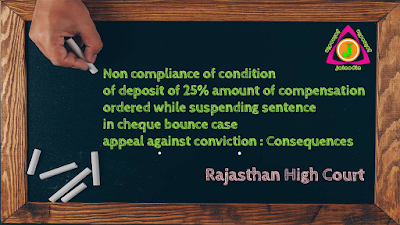
The Court which has suspended the sentence on a condition, after noticing non- compliance of the condition can very well hold that the suspension of sentence stands vacated due to non-compliance. [Para No.18]

The Court which has suspended the sentence on a condition, after noticing non- compliance of the condition can very well hold that the suspension of sentence stands vacated due to non-compliance. [Para No.18]
Does Family Court have jurisdiction in respect of dispute where marriage is not solemnized as per law
Love relationship developed between Male petitioner and female respondent belonging to different cast. They without actually performing marriage secured a false certificate from an institution indicating that they have solemnized the marriage. On the basis of such certificate they obtained marriage certificate from Municipal Corporation. After disclosure to their respective families FIR for the offences punishable under Sections 464, 465, 466, 468, 471 read with 34 of the Indian Penal Code as well as for the offence punishable under the Maharashtra Regulations of Marriage Bureau and Registration Act, 1998 came to be registered.

Applicant-male filed petition in Family Court for seeking declaration that he is unmarried and that the marriage certificate to be null and void. The prayer is not objected by Respondent-female; still Family Court observed that the jurisdiction of Family Court can be invoked if someone is married as per law and dismissed that petition on the ground ground that it lacks jurisdiction to entertain the petition.
Held:
Conjoint reading of sections 7 and 8 of the Family Courts Act makes it clear that the jurisdictions covered under section 7 of the Act are excluded from the purview of jurisdiction of civil court.
Legal words:
civil,
declaration,
family court,
high court,
illegal marriage,
jurisdiction,
Love relationship,
null and void
22 April 2020
Can adverse inference be drawn against prosecution for non examination of Investigating Officer?
The investigating officer was not brought before the Court for the reasons best known to it.
 Thus, the defence was deprived of the opportunity of proving this material omission for want of presence of investigating officer. In such a situation an adverse inference must be drawn against the prosecution.
Thus, the defence was deprived of the opportunity of proving this material omission for want of presence of investigating officer. In such a situation an adverse inference must be drawn against the prosecution.Plea of adverse possession without admitting ownership of real owner is not tenable
In law there is presumption in favour of the continuity of the tenancy and against the possession of the tenant becoming adverse. Furthermore, the doctrine of tenant estoppel, which continues to operate even after the termination of the tenancy, debars a tenant who had been let into possession by a landlord, from disputing the latter's title or pleading adverse possession, without first openly and actually surrendering possession of the tenanted premises and restoring them to the landlord. [Para No.37]

The question of adverse possession without admitting the title of the real owner is not tenable.[Para No.41]
21 April 2020
How to prove a WILL?
At least one of the attesting witnesses is required to be examined to prove his attestation and the attestation by another witness and the testator.

Once the Will has been proved then the contents of such document are part of evidence. Thus, the requirement of Section 63 of the Act and Section 68 of the Evidence Act stands satisfied. The witness is not supposed to repeat in a parrot like manner the language of Section 68 of the Evidence Act. [Para No.23]
Every procedure is permitted to the court for doing justice unless expressly prohibited
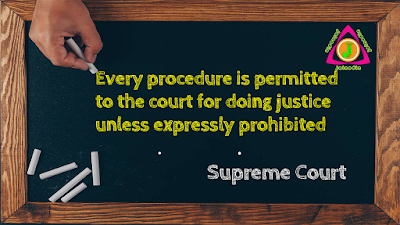 Rules of procedure are handmaids of justice. Section 151 of the Code of Civil Procedure gives inherent powers to the court to do justice. That provision has to be interpreted to mean that every procedure is permitted to the court for doing justice unless expressly prohibited, and not that every procedure is prohibited unless expressly permitted. There is no express bar in filing an application for withdrawal of the withdrawal application.
Rules of procedure are handmaids of justice. Section 151 of the Code of Civil Procedure gives inherent powers to the court to do justice. That provision has to be interpreted to mean that every procedure is permitted to the court for doing justice unless expressly prohibited, and not that every procedure is prohibited unless expressly permitted. There is no express bar in filing an application for withdrawal of the withdrawal application.19 April 2020
Burdon of proof is on the party who claims the property to be joint property of Hindu Undivided Family
The law is well settled that the burden is on the person who alleges that the property is a joint property of an HUF to prove the same.[Para No.10]
It is clear that not only jointness of the family has to be proved but burden lies upon the person alleging existence of a joint family to prove that the property belongs to the joint Hindu family unless there is material on record to show that the property is the nucleus of the joint Hindu family or that it was purchased through funds coming out of this nucleus. [Para No.19]
18 April 2020
Bail applications has to be decided expeditiously
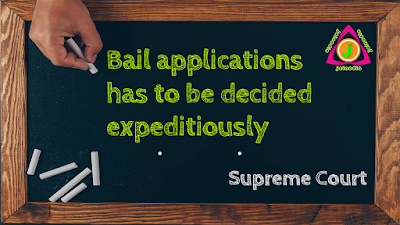 The application for bail or anticipatory bail is a matter of moment for the accused and protracted hearing thereof may also cause prejudice to the investigation and affect the prosecution interests which cannot be comprehended in this order. Such application needs to be dealt with expeditiously and finally, one way or the other and cannot brook delay.
The application for bail or anticipatory bail is a matter of moment for the accused and protracted hearing thereof may also cause prejudice to the investigation and affect the prosecution interests which cannot be comprehended in this order. Such application needs to be dealt with expeditiously and finally, one way or the other and cannot brook delay.
Subscribe to:
Posts (Atom)


